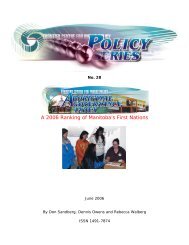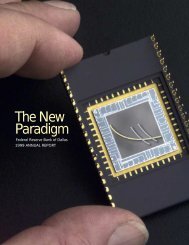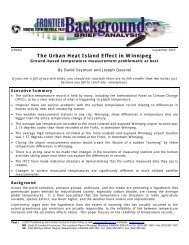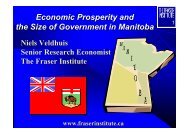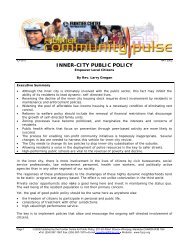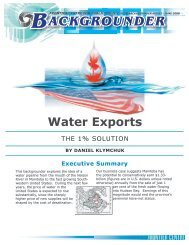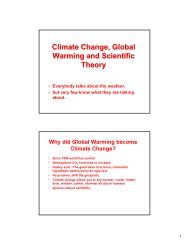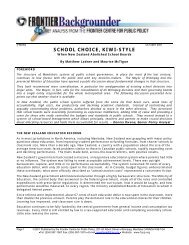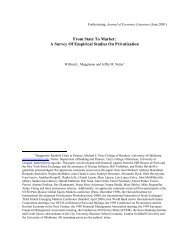View entire study as PDF - Frontier Centre for Public Policy
Create successful ePaper yourself
Turn your PDF publications into a flip-book with our unique Google optimized e-Paper software.
MONEY FOR NOTHING AND YOUR CHEQUES FOR FREE<br />
P O L I C Y S E R I E S<br />
8<br />
• In 2006, in a paper <strong>for</strong> the federal<br />
government, the Aerospace Industries<br />
Association of Canada <strong>as</strong>serted that<br />
Governments “invest” in their aerospace<br />
industries because of the benefits to be<br />
reaped” (AIAC, 2006).<br />
Meanwhile, back in the world<br />
of empirically verifiable<br />
studies…<br />
A second type of <strong>study</strong> on the issue of<br />
corporate welfare comes from the peerreviewed<br />
world, and they are not, in<br />
general, supportive of the reliability of<br />
non-peer reviewed research, or the claims<br />
made about the benefits of “targeting” by<br />
such works. Economist D.K. Lee argues<br />
that despite their popularity, studies<br />
that purport to show a benefit from<br />
“targeting”—public money given or loaned<br />
to business—have never been scientifically<br />
validated (D.K. Lee, 1992). Another<br />
economist who h<strong>as</strong> written extensively on<br />
subsidies to business, Terry Buss, offers a<br />
succinct analysis of why such studies are<br />
not validated and probably never will be:<br />
Validation is likely impossible because<br />
targeting violates b<strong>as</strong>ic economic re<strong>as</strong>oning,<br />
uses unsound methodologies and<br />
faulty data, and encourages inappropriate<br />
political interference, benefiting some<br />
at the expense of others. Perhaps this is<br />
why targeting studies are not published<br />
in professional economic, social science,<br />
or policy studies journals but only appear<br />
<strong>as</strong> unpublished consultant reports, details<br />
of which are rarely disclosed, are simplistic,<br />
employ meaningless me<strong>as</strong>ures (Buss,<br />
1999).<br />
Buss notes such targeting studies violate<br />
sound social science methods and thus are<br />
not scientific. He points out they: employ<br />
fallacious re<strong>as</strong>oning; utilize expediency<br />
rules—i.e. some inconvenient data is<br />
FCPP POLICY SERIES NO. 88 • APRIL 2010<br />
excluded, and propriety and secrecy are<br />
observed—which are the exact opposite<br />
of the disclosure of data and methods<br />
necessary and required in science so that<br />
others can check one’s claims; produce<br />
conflicting and meaningless targets;<br />
exaggerate benefits claims; often doublecount<br />
benefits; over- or under-state costs;<br />
and fail to consider opportunity costs.<br />
In short, Buss writes that, “Targeting<br />
eschews theory and causality in favour<br />
of any interesting or useful <strong>as</strong>sociation<br />
that can justify targets. Philosophers of<br />
science refer to running everything against<br />
everything <strong>as</strong> ‘rank empiricism’” (Buss,<br />
1999).<br />
The second camp of studies, the academic<br />
or peer-reviewed variety, is less amenable<br />
to the temptation or error of avoiding<br />
important factors in the debate over<br />
business subsidies. That second camp will<br />
not, <strong>for</strong> example, miss the substitution<br />
effect. The substitution effect is where<br />
money poured into one company or sector<br />
is not <strong>as</strong>sumed to magically appear out<br />
of thin air, but is recognized to have been<br />
collected from others individuals and businesses,<br />
and had the initial money stayed<br />
with those who created it, it would have<br />
had its own economic effect, along with<br />
jobs created and tax revenues created.<br />
Clear examples come from the automotive<br />
and aerospace sectors. When money is<br />
given to GM, Chrysler, Bombardier and<br />
Pratt & Whitney, the justification is that<br />
jobs are created or saved, that economic<br />
expansion will take place, and that tax<br />
revenues will be created. However, the<br />
claim is only true in a narrow regional<br />
sense. If the market <strong>for</strong> automobiles<br />
in North America in a given year is 12<br />
million units, some automotive company<br />
somewhere will fill that demand. If<br />
not Chrysler, then Ford; if not Honda,<br />
then Hyundai. Similarly, an aerospace<br />
© 2010<br />
FRONTIER CENTRE




